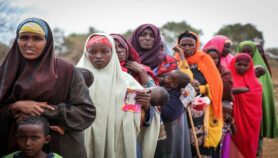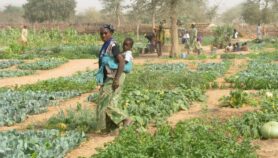Send to a friend
The details you provide on this page will not be used to send unsolicited email, and will not be sold to a 3rd party. See privacy policy.
There is a history of resistance to the adverse effects of climate in Africa — so damage isn’t inevitable, argues Katharine Vincent.
It is commonly upheld — at least by the media — that Africa is a frontline victim of climate change.
It is true that at the continental scale Africa may suffer because of it is geographic and economic vulnerability. But branding Africa as a victim does a disservice to the many examples of small-scale resilience and adaptive capacity in evidence throughout the continent.
Furthermore, perpetuating the ‘Africa as victim’ myth runs the risk of deflecting attention away from a systematic investigation into how such resistive measures could be expanded to reduce vulnerability.
A more realistic picture
The year 2007 marked the release of the long-awaited fourth assessment report of the Intergovernmental Panel on Climate Change (IPCC), which looked at the impact of climate change on different parts of the world and their adaptation and vulnerability to its effects.
The report confirms that Africa is one of the most vulnerable continents and will be exposed to the adverse impacts of climate variability and change. Agricultural productivity is likely to be constrained by water stress and a decrease in the land area suitable for farming — with a reduction in yields of up to 50 per cent predicted for some parts of the continent by 2020.
But the report also highlights evidence that African people are coping with and adapting to climate variability and change. Although it does not indicate whether these responses will be sufficient in practice to deal with the rate and magnitude of projected change, they provide grounds for optimism.
Still, the press response to the report, both internationally and in Africa, has emphasised the vulnerability of the continent over its potential adaptive capacity.
It is important to recognise that there will be adverse effects, but portraying the continent as helpless legitimises a sense of resignation to the fact that climate change will merely contribute to ongoing poverty and leave Africa on an unavoidable downward trajectory.
Groundwork to reduce vulnerability
The outlook need not be so bleak. We should be attempting to understand the complex coping and adaptation strategies that are in operation and to identify where these are working and where they need to be improved.
Researchers investigating coping and adaptive capacity at different levels on the continent — from household efforts to national strategies covering both social and biophysical systems — have compiled a cohort of studies that exemplify emerging generic processes.
Farmers, for example, are flexible in their livelihood choices, which enable them to respond to weather conditions on a year-by-year basis. In a dry year they may seek alternative pasture for their cattle and irrigate their crops. If a drought is long lasting, male members of the household might migrate to the city in search of alternative employment.
Emerging recognition of the bottlenecks constraining effective adaptation has also promoted research into tools that can be used to reduce vulnerability. For example, seasonal climate forecasting enables both commercial and subsistence farmers to respond on an annual basis to anticipated weather conditions.
Farmers in several southern African countries, including South Africa and Zimbabwe, are currently benefiting from improved information on seasonal weather conditions.
Ecologists and social scientists working on the coupling of physical and social systems have highlighted the need for adaptive co-management that recognises the interrelationship between the physical and human environment. A variety of institutions, working at local through to national and regional levels in Africa, are embracing this attitude.
They are taking a more holistic approach to development, to reducing the risk of disasters, and to mitigating and adapting to climate change. This includes provision of national weather services and of a growing number of disaster-management agencies, which are being set up following the introduction of national disaster-management policies and plans.
Confronting the situation
Faced with the media’s despair, we can hardly blame African policy-makers for feeling helpless against climate change and for not believing that adaptation can be achieved. As a result, policies focusing on national climate change are scant and weak where they do exist, although the issues are recognised to varying degrees in formulating policy in related spheres, such as water supply, agriculture and disaster management.
Taking a more proactive approach to adaptation — recognising the continent’s strengths and identifying weaknesses and obstacles in the way of achieving it — is a much more constructive response to the IPCC’s fourth assessment report.
It is one that should encourage Africans to seek the most effective means of help from themselves and others, thereby ensuring that vulnerability in the face of future climate change is reduced.
Katharine Vincent is a postdoctoral researcher with the ReVAMP research group at the University of the Witwatersrand, Johannesburg, and a contributing author to the IPCC fourth assessment report.













